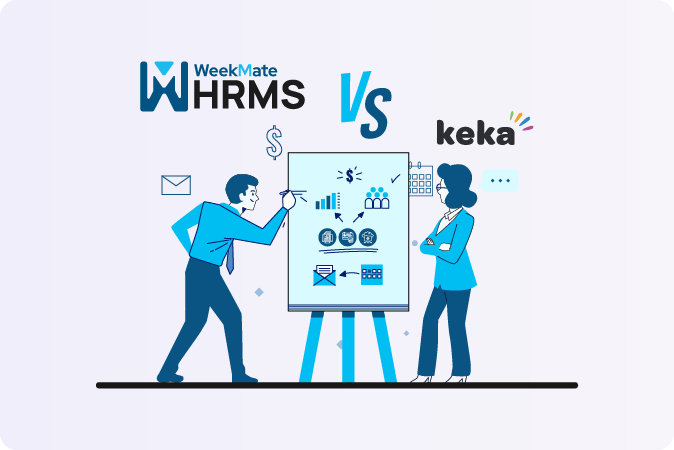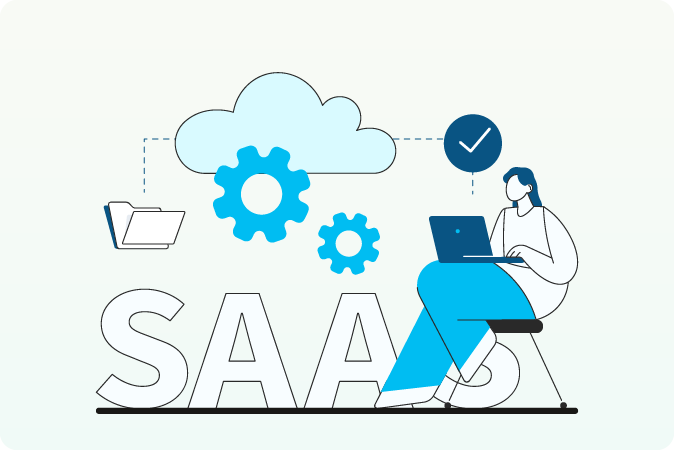
Growing startups, small and medium businesses, as well as enterprises, need a structured way to handle HR tasks. As hiring increases, so do responsibilities around payroll, time tracking, performance management, and employee data. Doing this manually or across multiple tools leads to delays and inconsistent records.
WeekMate’s HRMS helps centralize these processes into one platform. It gives teams better control over attendance, approvals, onboarding, and compliance. Two platforms commonly considered for this purpose are HRMS (WeekMate) and Keka.
Both systems support core HR operations, but their pricing, setup, and overall experience differ. HRMS focuses on simplicity and predictable usage costs. Keka offers a wider set of features with a subscription-based structure.
This comparison of HRMS vs Keka highlights exactly where each tool fits. You’ll also find out why many businesses are actively looking for Keka alternatives that offer more flexibility without adding recurring fees.
What is an HRMS and Why Businesses Need It?
An HRMS, or Human Resource Management System, is software that helps businesses organize, automate, and track various HR functions.
Most businesses use an HRMS for the following reasons:
- Manage employee data and records
- Automate payroll processing
- Track attendance, leave, and shifts
- Streamline recruitment and onboarding
- Handle performance reviews
- Centralize compliance documentation
As companies grow, spreadsheets and emails no longer cut it. That’s when a structured platform like
WeekMate HRMS or Keka becomes necessary. They reduce manual tasks and make it easier for teams to scale without adding operational chaos.
Key Features of HRMS
Here are the most important features of HRMS:
Core HR Functions
- Employee records and documents
- Leave & attendance tracking
- Organizational structure mapping
Payroll & Compliance
- Automatic payslip generation
- Tax & statutory compliance
- Expense reimbursements
Performance Management
- Goal setting
- Reviews & feedback
- Team targets tracking
Recruitment Tools
- Job postings
- Applicant tracking
- Onboarding process flows
Reporting & Analytics
- User reports
- Audit trails
- Real-time dashboards
HRMS includes a wide range of these features, but the way they’re delivered, priced, and accessed differs from Keka. If you’re searching for Keka alternatives, this system deserves a close look.
Benefits of Using HRMS
HRMS system helps reduce workload and improves accuracy across HR operations. Some common benefits include:
- Centralized access to employee data
- Less paperwork and manual errors
- Real-time attendance and leave tracking
- Clear visibility into team performance
- Easy audits and report generation
- Better collaboration across HR, payroll, and department heads
These benefits are especially helpful for remote and hybrid teams who need reliable tools to keep everyone aligned.
Here’s how the two platforms compare when it comes to features and experience.
WeekMate HRMS vs Keka – Feature Comparison
| Feature | WeekMate HRMS | Keka |
|---|---|---|
| Pricing | No per-user cap, grow without worrying about added cost | Subscription-based pricing |
| Deployment | Cloud-based, modular setup | Cloud-based platform |
| Remote Work Features | Built-in WFH, comp-off, approvals | Mobile app and GPS attendance |
| Attendance & Leave | Attendance regularization, comp-off, shift tracking | Shift management, leave approvals |
| Payroll | Automated, integrated with HR workflows | Fully integrated payroll & compliance |
| Performance Management | Personal goals, team targets, rankings | 360° reviews, OKRs, one-on-one meetings |
| Recruitment | Job openings, onboarding process | Hiring tools, ATS, offer management |
| User Interface | Simple and easy to onboard | Employee-focused experience |
| Integration Options | ERP and internal tool support | Limited ERP integration options |
| Training & Support | Live demos, user docs, onboarding help included | Email and phone support |
| Target Team Size | SMEs to large businesses | Mid-size to large enterprise teams |
| Security | Enterprise-grade security with cloud hosting | GDPR and ISO compliant |
One key highlight of WeekMate is that it offers no per-user cap, meaning you don’t have to calculate extra costs every time you add someone to your team. This makes it ideal for growing teams looking for a predictable expense model.
Real-World Usability
Businesses often prefer tools that are easier to deploy and adopt. Here’s what stands out in usability:
- WeekMate HRMS offers a clean, clutter-free dashboard and modular tools that can be added based on needs.
- Keka focuses heavily on visual design and employee self-service. While this looks appealing, it can feel a bit much for smaller teams.
In real-life feedback, teams appreciated WeekMate for its plug-and-play model. Based on one Keka HRMS review, some users found the onboarding and setup process slightly time-consuming due to feature depth.
Support & Implementation
Good software is only as good as its support. WeekMate keeps it simple:
- Implementation happens in 4 guided steps: planning, setup, training, and go-live.
- There’s a clear rollout strategy for every team size.
Unlike subscription models that often tie better support to premium plans, WeekMate includes training and help resources for all users, regardless of company size or usage.
In contrast, while Keka offers documentation and onboarding help, some clients (based on Keka HRMS review feedback) noted delays in issue resolution during peak onboarding times.
When to Consider Keka Alternatives?
Keka is well-known in the HR software space, but it may not suit every business.
You may want to explore Keka alternatives if:
- You want a pricing model that doesn’t involve monthly renewals
- Your team is small to mid-sized
- You need a faster setup with fewer features to start
- You require ERP integrations from day one
- You prefer tools with no per-user limit to avoid budgeting headaches
WeekMate is an ideal alternative in these situations. It gives you control, reduces dependencies, and supports team expansion without additional user-based charges.
Final Verdict – Which One Should You Choose in 2025? (Expert Opinion)
If you’re a mid to large enterprise that needs in-depth workflows and advanced reviews, Keka offers powerful tools. But you should be ready to invest time in onboarding and pay recurring subscription fees.
If you’re a growing business looking for a scalable, simple, and budget-stable solution, WeekMate HRMS is a better choice. The lack of monthly fees and absence of per-user limits make it a practical and straightforward option for companies that don’t want to deal with pricing complexity.
To summarize:
- Go for Keka if you’re already in a large HR operation, want detailed insights, and can manage the learning curve.
- Choose WeekMate HRMS if you need smart automation, quick setup, and cost-efficient HR management without worrying about renewals or user caps.
Whether you’re upgrading your current platform or searching for Keka alternatives, make sure you evaluate based on your team size, budget, and implementation timeline.
At the End!
Both platforms have strong use cases, but the right one depends on your specific goals. WeekMate HRMS vs Keka entails picking what suits your workflow and team dynamics best. And in 2025, with growing remote teams and tighter budgets, tools like WeekMate offer a simpler, stronger path forward.
If you’ve been asking, “What are my real options?”, the answer is clear: compare what matters, not just what’s marketed.
FAQs
1. What everyday HR tasks does WeekMate HRMS help with?
WeekMate HRMS makes it easy to handle the big jobs like paying staff, tracking attendance, managing leave, hiring new people, and storing employee records. You can also use it to set team goals, keep up with performance reviews, and even organize off-boarding when someone leaves. All these jobs can be done in one place, no need for a bunch of different apps.
2. Which tool is easier to set up and adopt — WeekMate or Keka?
WeekMate uses a modular, plug-and-play approach that lets you start simple and expand later. The rollout from planning through to go-live is usually fast. With Keka, you get a richer feature set from the start, but some users say the setup can take time because of the deeper functionality.
3. What happens when my team grows? Which is more scalable without hidden costs?
WeekMate shines here because there are no per-user caps or rising subscription costs. You can add users without worrying about your bill jumping. Keka is scalable, but your subscription cost will generally grow as you add more users or activate more modules.
4. Which kind of business would benefit more from WeekMate vs Keka?
Choose WeekMate if you’re a startup, small or medium business, or rapidly growing team that wants control over costs, simpler setup, and modular growth.
Choose Keka if you’re an enterprise with complex HR workflows, need advanced modules (e.g. 360 reviews, OKRs), and don’t mind paying subscription costs for depth and polish.
5. What makes WeekMate HRMS better value than Keka?
The biggest difference is the pricing model. WeekMate HRMS has no per-user fees. Keka uses a subscription system, so you keep paying as your team grows. WeekMate also has a plug-and-play setup that gets you running quickly, plus strong support for onboarding and training, all included.



